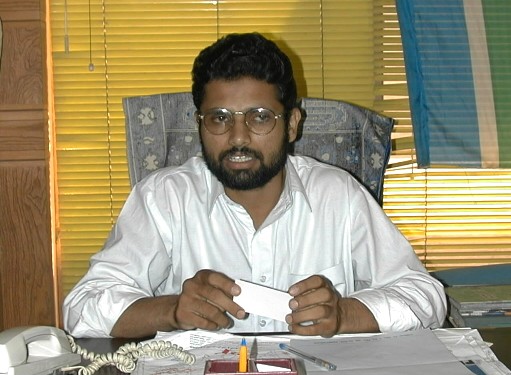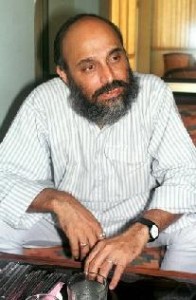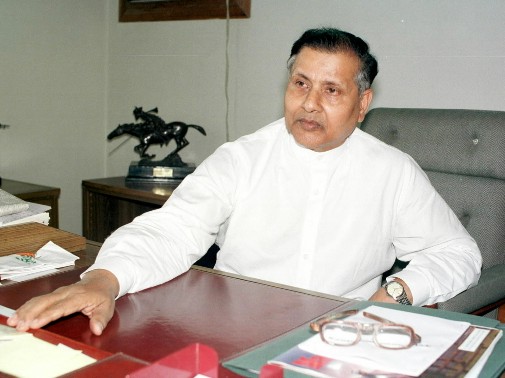Humanity Must Survive: A-bomb Survivor’s Journey to India and Pakistan, Part 5
Jul. 4, 2010
Deep-seated nuclear myth
by Tetsuzo Yamane, Staff Writer
This look back at an A-bomb survivor's travels in India and Pakistan was originally published in July 1998.
Stressing the need to ensure their own security
I found the office, a one-story wooden building, in a shopping district on the outskirts of Rawalpindi in Pakistan. Urdu words and a picture of a fist were painted on its yellow sign.
It was the office of the Islamabad branch of the "Shabab-e-Milli," an Islamic fundamentalist organization. The group has proclaimed the supremacy of Islamic beliefs and is in sharp conflict with India, a Hindu-majority nation. The branch has over 5,000 members.
Sajid Iqbal, the stern-faced head of the branch, greeted me in a room of less than ten square meters. Seven men in traditional dress that looked like a knee-length shirt sat down on a sofa by my side, their arms crossed.
On June 2, this group stormed a news conference in Islamabad, near Rawalpindi, at which a citizens' group was protesting their nation's nuclear tests. In the scuffle, someone was injured. "What happened at the news conference?" I asked. The moment I spoke, Mr. Iqbal, who had been talkative up to that point, fell silent. The smile that had formed on his face vanished.
He paused for a moment, then continued speaking. He said that the people of Pakistan enjoyed freedom of expression, freedom of speech. However, he went on, nuclear weapons are a source of power and security and words and deeds that oppose nuclear testing and endanger the nation cannot be tolerated. The other members present voiced their support forcefully in Urdu.
Mr. Iqbal calmed the men and declared that if anyone made a similar protest, they would again try to block the action.
The Foundation for Research on International Environment, National Development and Security, or "FRIENDS," a nongovernmental organization (NGO), also has an office in Rawalpindi. The organization, established in 1991, has about 400 members, including researchers and former military officers.
In Japan, the term "NGO" is associated with the "peace movement." In fact, FRIENDS is a member of "Abolition 2000," a campaign promoting the elimination of nuclear weapons.
At the same time, Mirza Aslam Beg, chair of the NGO, expressed support for the nuclear tests from the group's office in a two-story building located in an upper-class residential area.
Mr. Beg is a former chief of army staff of the Pakistan Army. He stated with certainty, in a tone as stern and firm as his expression, that his nation conducted the nuclear tests to maintain a balance of power with India and that Pakistan needed to stand up to its neighbor.
His comments focused on criticism of the nuclear powers as well as justification of his own nation's nuclear tests. He said that the nuclear powers sought to prevent other nations from possessing nuclear weapons while instead exporting their conventional weapons and fomenting regional conflicts.
In India, too, I have repeatedly heard a certain nuclear myth. At the Institute for Defense Studies and Analyses, a government-affiliated institute in New Delhi near Jawaharlal Nehru University, deputy director Commodore Udaya Bhaskar argued that the world began to consider nuclear disarmament seriously after nuclear tests were conducted in India.
Mr. Bhaskar, while asserting that he favored the abolition of all nuclear weapons, explained that the nations of the world, not simply the United States and Russia, were also obligated to ensure their own security in the post-Cold War era. He concluded his argument by saying that, though it might sound paradoxical, India was in the same position as the A-bomb survivors (hibakusha) in that the nation was pursuing nuclear disarmament.
But these three people have never met hibakusha. Yasuhiko Taketa, 65, a hibakusha and a resident of Aki Ward, Hiroshima, who went on a journey of peace to India and Pakistan, said, his voice rising with impatience, "They say that the theory of nuclear deterrence is a reflection of reality. But the environmental contamination and the danger of nuclear war due to nuclear testing are also realities."
(Originally published on July 7, 1998)










